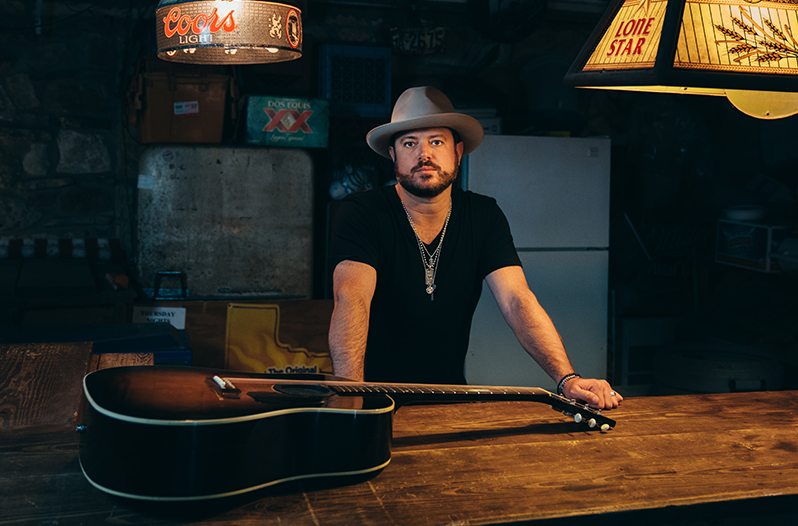Wade Bowen's Solid Ground finds the Texas troubadour pressing forward into the unknown while maintaining a firm grip on his roots. As his seven studio release, much of Solid Ground plays out like a comfortably worn roadmap and a love letter mixtape to his native Texas. Solid Ground is as much an exhibition into Bowen's past as it is an ode to Bowen's musical heroes.
He hits all the major highlights — Waco, Austin, Lubbock, the Hill Country, Far West Texas, Mexican border towns — throughout the 11 tracks. Each pitstop isn't just an anecdote or Bowen reminiscing though. They're also opportunities for Bowen to showcase the broad spectrum of sonic influences from the state. It's Mariachi odes, Guy Clark lessons, badland suites, Robert Earl Keen border ballads, ZZ Top riffs, and a bevy of other Texas staples. With veteran musician Keith Gattis serving as a guide voice and producer, Bowen and company deliver a sprawling Texas soundtrack that's vibrant, dark and consistently pushing the album ahead.
Still, on the surface, the majority of that can be generalized to describe most of Bowen's work. The difference is Bowen's focus, drive and ever-growing capacity as a great songwriter. For long stretches of Solid Ground, Bowen is nostalgic. Singles such as "Acuna" and "So Long Sixth Street" are obvious moments in which he's looking back on the past. But they aren't just Bowen reminiscing about salad days and forgotten good times. In the grand scheme, they serve a larger purpose. Solid Ground is Bowen also going off into new territory. He's often contemplating his own mortality, his sense of faith and how the past guides the future. It's redeeming and reassuring despite asking difficult questions and raising tough subjects.
The majority of Bowen's past albums have displayed his prowess as a good songwriter with a knack for melody and memorable choruses. But he's never been this thought-provoking or gripping. For much of his career, Bowen has a been great checkers player. On Solid Ground though, Bowen has proved to be a mightly chess player as well.
From the jump, he sets a serious tone and mood that rarely wavers. Sure, Solid Ground delivers radio worthy anthems. Even so, songs aren't cut into nifty three-minute portions. Songs linger. They build and sway with exhales and deep breaths. For the vast majority, Bowen treks into darker territory with moments of intimacy that leave him vulnerable and exposed. It's humanizing and humbling. It captures Bowen in various states of confidence, uncertainty, satisfied with past and hopeful for the future. Throughout Solid Ground, Bowen's growth as an artist is on full display.
Below, we guide you through the major influences, stories and thought process behind Wade Bowen's Solid Ground.
1. "Couldn't Make You Love Me"
- Early morning songwriting sessions really set the pace for Solid Ground. Bowen typically brings 20 to 30 songs to the table for each record. Producer Keith Gattis pushed Bowen to dig deeper and continue writing throughout the entire project. Songs such as "Couldn't Make You Love Me," "So Long 6th Street," and "Acuna" came out of this invigorating artistic process. It was the first song recorded for Solid Ground.
- "Couldn't Make You Love Me" started off with a lick by guitarist Audley Freed. Freed's a former guitarist of The Black Crowes and has toured with the likes of Dixie Chicks, Gov't Mule, and Jakob Dylan. The first line, "I had a dream I was a riverboat captain on the Brazos Queen," was written by Gattis. The Brazos Queen is a nod to Bowen's roots in Waco. There's hints of Tom Petty harmonica and clean, smooth guitar grooves.
- "Sonically, we knew it was exactly what we wanted the record to sound like. Keith turned to me and said that from here on out, every song was going to be measured up against it. It was the measuring stick."
2. "Day of the Dead"
- "Day of the Dead" is primarily influenced by excursions to the Texas-Mexico border in West Texas. Lajitas is nestled between Big Bend National Park and Big Bend Ranch State Park. Bowen captures the arid landscape with Spaghetti Western horns and Mariachi-tinged guitar. Bowen recalls a playing a music festival there with Gattis several years ago as an inspiration for the song.
- "Day of the Dead" is the only song Bowen didn't write on Solid Ground. Gattis isn't just a suburb producer, he's an accomplished songwriter. The likes of Randy Rogers Band, Charlie Robison, George Strait, Gary Allan and George Jones have all cut songs written by Gattis.
- "Keith brought it to me with the intentions of us finishing it. I listened to it and told it was already done. I wasn't going to try and weasel my way in for a writing credit."
3. "So Long 6th Street
- "So Long 6th Street" finds Bowen reminiscing about his time Austin after graduating from Texas Tech University in Lubbock. Bowen recalls that the two years spent in Austin were the biggest struggle in his career. Despite the struggles, it helped shape Bowen and made him realize just how much he wanted to be a songwriter.
- Jack Ingram and Miranda Lambert both provide harmony vocals on the nostalgic anthem. Ingram became involved after a Nashville studio visit. Bowen recalls being under the weather and trying to rest his for the next day. He woke up to a picture of Ingram in the vocal booth singing harmonies. Bowen asked Lambert if she would sing after thinking she'd relate to the song. Bowen has gone on tour runs and reconnected with Lambert these past few years.
- "It was one of those songs where you knew as you were writing it, that it was going to be a good one. They don't come along like that all the time. You feel good about songs, but not like that."
4. "Broken Glass"
- "Broken Glass" is one of Bowen's most revealing and intimate ballads to date. Bowen isn't just apologetic and regretful, he leaves himself exposed and vulnerable. It's the lone track on Solid Ground that isn't a co-write and is one of the oldest songs on the album.
- Bowen cites Ryan Adams a major influence on "Broken Glass." He was inspired by Adams' often brutally honest lyricism.
- "I wrote that one night after I said something I really regret saying to my wife. She slammed the door and went to bed. I stayed up all night writing that song."
5. "Death, Dyin' and Deviled Eggs"
- "Death, Dyin' and Deviled Eggs" was co-written with songwriter Jon Randall. Bowen and Randall were heavily influenced by Guy Clark on the uplifting funeral song. It was written roughly two weeks after Clark's passing. Bowen says they spent the day talking about Clark memories, but that it wasn't about Clark's passing. Clark appeared on Bowen's album The Given where the two sing the Townes Van Zandt staple "To Live Is To Fly."
- Despite being a song about a funeral, "Death, Dyin' and Deviled Eggs" isn't overly somber or sad. In many respects, it's about gratitude. It's one of many examples on Solid Ground where Bowen openly questions mortality.
- "Jack Ingram always says when you're writing, if you had to sit on stage with Guy Clark or Kris Kristofferson, would you be excited to sing the song or would you be embarrassed? Would you even want to sing it? I'm sure Guy would talk shit like he always did. He had a blunt honesty to him that was so amazing. But I'd feel good singing that in front of him on stage. There's not many I've written I would say that about."
6. "7:30"
- "7:30" was written by Bowen, Angaleena Presley and Waylon Payne. It revolves around a sweet and delicate melody by Payne. The subject matter of "7:30" is much dejected and sorrowful. It's the account of being delivered the news of a loved ones passing. Each line unfolds with a sharp and crisp image of the unforgettable memory. With "Death, Dyin' and Deviled Eggs," it delivers a heavy one-two punch.
- This is another example of Bowen, Freed and company being given room to breathe sonically. Bowen says they tried cutting down the elegant outro, but they ultimately felt it was a much-needed presence.
- "I think the original worktape is only two-and-a-half minutes. There's not really a true hook in the song. Waylon said he'd gotten a call early in the morning when one of his parents had passed away. It was 7:30. He suggested it and I thought it was perfect. It's a pretty good tribute."
7. "Acuna"
- "Acuna" was primarily inspired by Bowen's college days. Like "So Long 6th Street" and "Day of the Dead," it has Bowen going down a nostalgic rabbit hole. Bowen recalls trips from Lubbock down to the Frio River every September. He'd float the river during the day and drive to the Mexican border town of Acuna at night.
- The chorus lines of "We vanished into thin air. So fast we didn't know what went wrong. Just disappeared like the dancehalls. Woke up one morning and we were gone" are a nod to Texas' disappearing dancehall history and heritage.
- "I didn't have the bridge written. I said let's put a bridge in over this chord progression and then we'll write one later. I wrote the lyrics when I was doing vocals. That's something that was a first."
8. "Compass Rose"
- "Compass Rose" was co-written by Bowen and Andrew Combs. In many respects, it's a microcosm of Solid Ground's Texas road trip vibes. Where "Compass Rose" is guided by the narrator's significant other, Solid Ground is guided by Bowen's memories.
- "If you're going to make a different record, you can't just write with the same people. You have to challenge yourself. Actually, my favorite song Andrew and I wrote didn't actually make the record because it didn't fit the album."
9. "Anchor"
- "Anchor" was written by Bowen and Jeremy Spillman. Spillman and Bowen previously collaborated on the songs "My California" and "Sweet Leona" on Bowen's self-titled album. With its heavy subject matter, Bowen says he knew Spillman would understand what he was going for on the intimate ballad.
- Much like "Broken Glass," "Anchor" finds Bowen really opening up and feeling vulnerable. He questions his own worth throughout trying to decide on if he's a burden or a stable force with lines like "Am I an anchor or just a rock you got a drag around?"
- "'Anchor' is one of only two songs I've ever been afraid to play for my wife. It took a lot to get me to play it for her since it's such an open diary. The jest is that marriage isn't easy. It's hard. I don't care what anybody says. It's not a fairytale and there's nothing wrong with saying that. It doesn't mean it's bad. It's just tough."
10. "Fell in Love on Whiskey"
- "Fell in Love on Whiskey" was written by Bowen and Charlie Worsham. It's one of the more light-hearted moments on the album. Originally, the song was written as a bluegrass number.
- A major influence on the song's direction was Chris Stapleton's. Specifically, Bowen cites Stapleton's ability to take "Midnight Train to Memphis," originally a bluegrass song during his time in The SteelDrivers, and transform it into a bluesy southern rock song.
- "We wrote that a while ago. Both of us were kind of tired of writing the same way and thought we'd piss everyone off and write a bluegrass song to turn into our publishers. They'd hate that."
10. "Calling All Demons"
- "Calling All Demons" was written by Bowen and Seth James. It first appeared on The Departed album Adventus. Originally, it was simply titled "Demons" and was a regular when James was still in the band.
- "Couldn't Make You Love Me" and "Calling All Demons" help create juxtaposing bookends for the album. "Couldn't Make You Love Me" helps establish a rich sprawling nature that carries on through up until the very end. Both songs use religious motifs. While "Couldn't Make You Love Me" uses prophetic imagery ("I could walk on water," "I could part the seas," "I had been hanging on a cross, holes in both my hands"), "Calling All Demons" uses metaphors that compare demons to giving into your vices.
- "I almost wanted Eddie Vedder to appear in as one of those in the humming demon choir at the end. Obviously, it wasn't going to be a radio-friendly song so I didn't care if it took 12 minutes, I wanted it to get to that point near the end."




